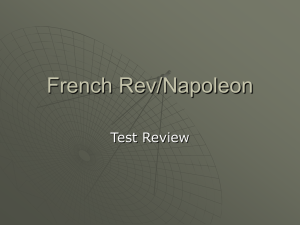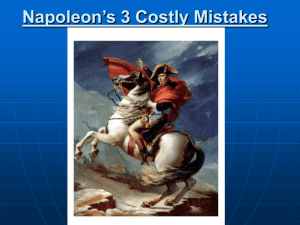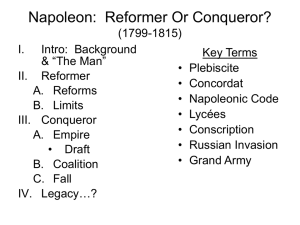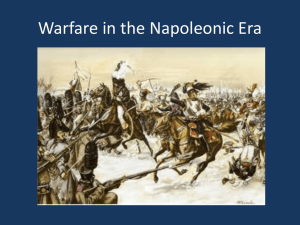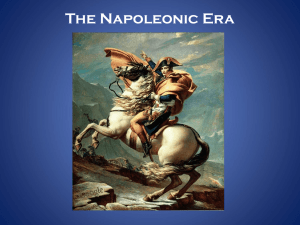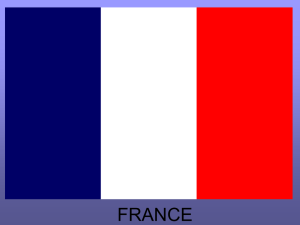Power Point
advertisement
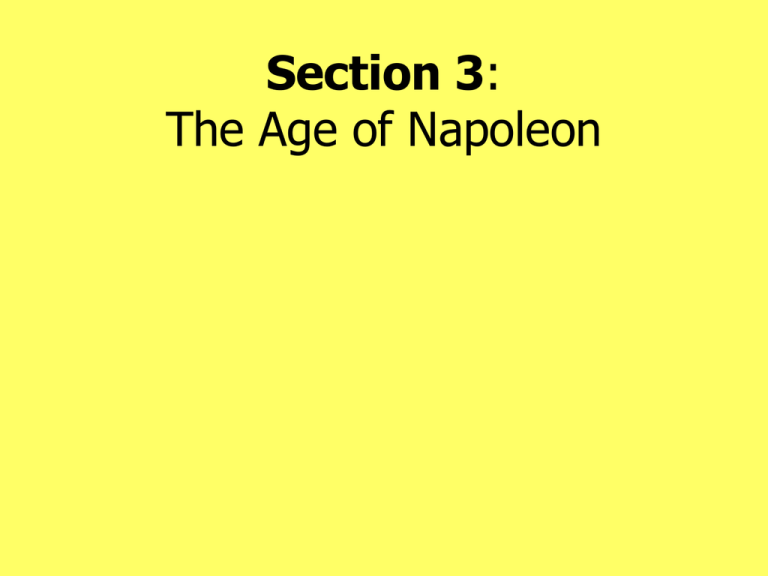
Section 3: The Age of Napoleon Chapter 6, Section 3 & 4 • Key Terms and People: plebiscite, Continental System, nationalism, Hundred Days, indemnity, reactionary • Guiding Questions: How did Napoleon rise to power and dominate Europe? What were Napoleon’s most important policies? What events caused disaster and defeat for Napoleon? What did the Congress of Vienna achieve? What is the legacy of the French Revolution? • Main Ideas: Napoleon Bonaparte rose through military ranks to become emperor over France and much of Europe. After defeating Napoleon, the European allies sent him into exile and held a meeting in Vienna to restore order and stability to Europe. The Directory (Where we left off last lesson) • Many of the Reign of Terror victims were former Jacobin leaders with Robespierre. In 1794, Robespierre was arrested, tried, and executed. • The Directory (conservative) ruled from 1795-1799. Largely unsuccessful and corrupt. • 1799, Napoleon Bonaparte staged a coup d’etat and seized power. Napoleon (1769-1821) • Officer under Louis XVI. • General at age 24. • Early success gained him notoriety. Energy, charm, and ability to make quick decisions Intelligence, ease with words, & supreme confidence http://www.paintingstogo.com/david/napoleon.jpg Napoleon as Emperor • He overthrew the Directory, imposed a new constitution, and named himself first consul • In 1804 crowned himself emperor by plebiscite, or vote. http://images.google.com/imgres?imgurl=http://www.ddg.com/LIS/InfoDesignF96/Emin/napoleon/images/personal/coronation.jpg&imgrefurl=http://www.ddg.com/LIS/InfoDesignF96/Emin/napoleon/photo.html&h=307& w=522&sz=69&tbnid=I7kZfQUW4qAJ:&tbnh=75&tbnw=128&start=21&prev=/images%3Fq%3DNapoleon%26start%3D20%26hl%3Den%26lr%3D%26sa%3DN The crowning of Emperor Napoleon I Napoleon as Stabilizer • Napoleon brought stability to France through the Civil Code and the Concordat. • The Concordat made peace with the Catholic Church, recognizing Catholicism as the religion of France. In return the Pope would not ask for the return of seized church lands. • The Civil Code (Napoleonic Code) affirmed the political and legal equality of all adult men, religious freedom, and economic equality. • Although Napoleon established stability in France, his desire for an empire, created disaster for the rest of Europe. Napoleon as Authoritarian • Limited free speech, routinely censoring newspapers • Established a secret police force and detained thousands of political opponents • Manipulated public opinion through systematic propaganda • Ignored elective bodies • Surrounded himself with loyal military officers • Set his family above and apart from the French people Joseph Fouche, head of Napoleon’s secret police Building the Empire • Napoleon’s Grand Army defeated the Austrian, Prussian & Russian armies. • His Empire was composed of three major parts: the French Empire, dependent states, and allied states • A sense of nationalism grew within France and conquered states Britain's Survival • • • The aim of the Continental System, a blockade on trade to GB, was to stop British imports. It failed, Allied States resented being told not to trade with Britain, others began to cheat, others resisted. Britain’s survival was due primarily to its naval power. (Despite Napoleon’s attempts.) http://www.napoleonguide.com/pd_15.htm Peninsular War (Guerrilla War) • Napoleon now controlled almost the entire European continent. • Efforts to enforce the Continental System eventually led him into war on the Iberian Peninsula and later Russia. • His traditional methods that had brought victory elsewhere did not work in Spain. • The loss of Spain, survival of GB, and rise in nationalism contributed to the eventual collapse of Napoleon’s Empire. Napoleon made his brother Joseph the king of Spain Russia (Logistics) • In 1812, Napoleon decided to invade Russia (Russian Campaign), believing that the Russians and Czar Alexander I, was conspiring with the British. • He assembled a massive army of 600,000 soldiers, but this limited Napoleon’s mobility. • Napoleon captured Moscow, but the Russians refused to surrender, and retreated for hundreds of miles into Russia. • They burned their own villages & countryside to keep Napoleon’s army from finding food. http://www.pinakoteka.zascianek.pl/Suchodolski/Images/Berezyna.jpg Napoleon abandoned Moscow late in October 1812 and began the “Great Retreat”. Less than 40,000 out of the original 600,000 managed to arrive back in Poland in January 1813. Defeat and Return • The Coalition (enemies and former allies) forced Napoleon to abdicate his throne in April 1814, restored the French monarchy (Louis XVIII), and exiled Napoleon to the island of Elba, near Corsica. • In March 1815, Napoleon escaped, returned to France, reconstituted his army, and went to Paris. • Louis XVIII fled to Belgium. Napoleon's Return • French allies declared Napoleon an outlaw, and many French who despised him for dragging France through years of war, were not happy. • However, thousands cheered him upon his return, beginning his Hundred Days of renewed glory. The Final Defeat • • At Waterloo in Belgium on June 18, 1815, Napoleon met a combined British & Prussian army under the Duke of Wellington & suffered a bloody defeat. By the end of the day casualties totaled around 50,000 This time, the victorious allies exiled Napoleon to St. Helena, a small island in the South Atlantic. http://www.imh.org/imh/jpg/waterloo.jpg Peace Negotiations • About 700 diplomats met at the Congress of Vienna to discuss order and stability after the Napoleonic Wars. • Reactionaries, wanted to restore Europe to its old monarchies and compensate allies for their losses. • National borders were redrawn to strengthen the countries bordering France. The Kingdom of the Netherlands and the German Confederations were formed. GB received foreign territories. Charles Maurice de Talleyrand (leader of France) was instrumental in these new boundaries. • France was also forced to pay a large indemnity for damages during the wars. Legacy of the French Revolution • Even though monarchs ruled again, Europe’s monarchs and nobles would no longer be secure in their privileges. • A few years after Napoleon’s fall, massive revolutions spread in Europe from end to end. • Ideas from the FR inspire people around the world to date. Wrap Up • How did Napoleon rise to power? • How did Emperor Napoleon come to dominate Europe? • What were Napoleon’s most important policies? • What events caused disaster and defeat for Napoleon? • What did the Congress of Vienna achieve? • What is the legacy of the French Revolution?



